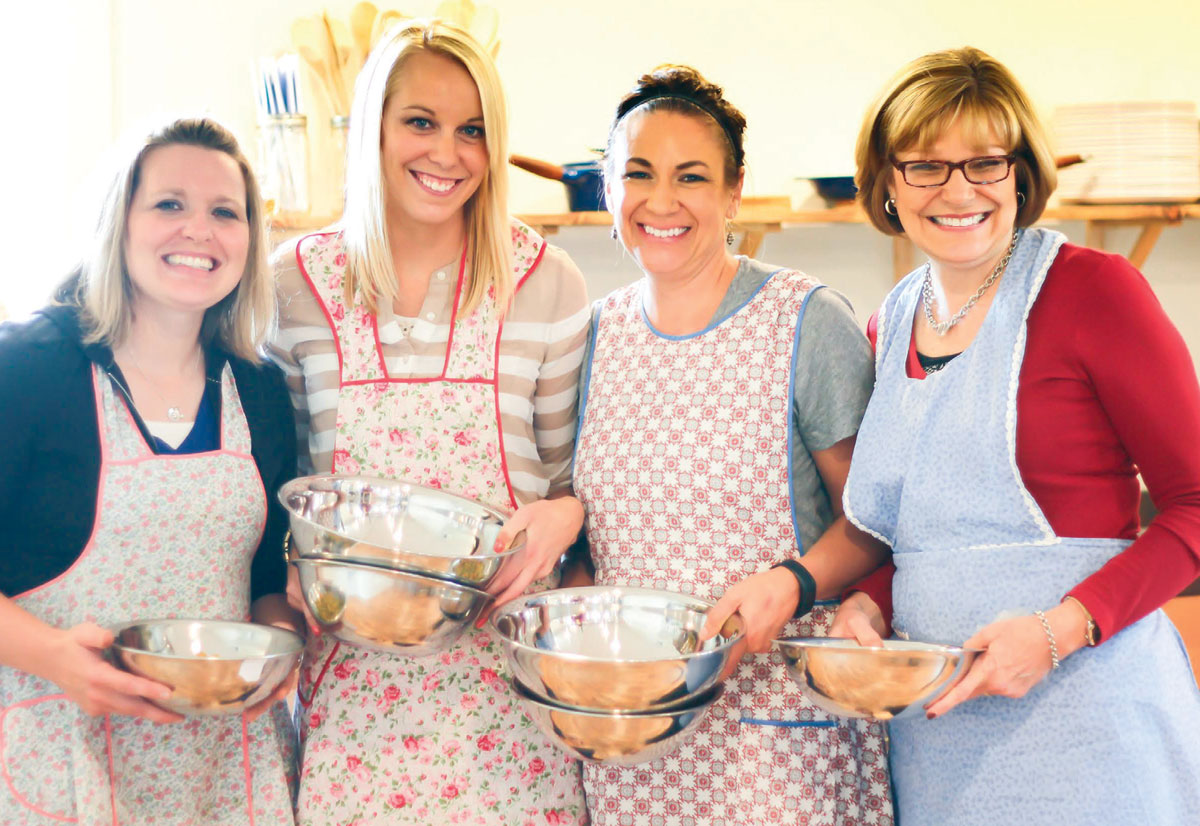Past Meets Present at Three Pines Farm
Past meets present at Three Pines Farm
For Kara Grupp of Three Pines Farm, the transition from scientist to folk school and studio founder started in an Iowa State University greenhouse.
Grupp worked with cotton at Iowa State, and her daily activities ranged from measuring DNA concentrations to leading educational outreach related to plant domestication and genomics. After introducing teachers, students and tour groups to various cotton plants, she taught them about differences in fibers and the evolution of the crop.
“People would just light up... This was not coming from a book – they were actually talking with each other, and seeing thing and touching things,” Grupp says. “Watching that unfold helped me realize the enormous value of hands-on education.”
She kept those enjoyable elements of her job in mind as she and her husband, Forrest Stowe, planned a 2013 move. Stowe needed to be closer to his Cedar Falls employer, so the couple explored options in the Cedar Valley. Then, Grupp’s father suggested they live at Three Pines Farm, the family’s 1855 farmstead outside of Cedar Falls.
“That just blew me away,” remembers Kara Grupp. As a child, she’d made a few visits to the land settled by her great-great grandparents, Norman and Jane Rundles. They had traveled from New York to Iowa by covered wagon, seeking fertile land and fresh opportunities. A decade after their arrival, Norman went to Wisconsin to gather lumber for a barn. Following a winter spent working in the pine forests, he shipped logs down the Mississippi River and then to Cedar Falls by rail. His 100-foot barn was carefully crafted, and he included gingerbread trim on the finished building.
Two Rundles children passed away while Norman was on the road. When he returned home, he planted four pine saplings that he’d carried back from Wisconsin. One didn’t survive the following winter, but the three remaining trees inspired the name that still distinguishes the family’s farm today.
When Grupp’s grandparents retired in the 1960s and left the brick house and smaller barn they’d added to the property, another couple moved in and cared for the crops. Now they, too, were ready to retire.
“It had never occurred to us that living there would be an option. It’s such a huge part of my family’s history. I thought, ‘I don’t know if my dad would trust me...’” Grupp says, with a laugh.
After she and her husband decided to relocate to the farm, Grupp thought back to the educational and social components of her Iowa State job. Using those as inspiration, she outlined an idea for a studio and school that would offer back-to-basics workshops teaching traditional skills – things like cooking, canning, coffee roasting, cheesemaking and crafting.
“There are so many people who have so many interesting gifts and talents, and it’s often not brought to the surface in our communities,” she says. “I wanted to create a space for people to get together and really learn about what others are doing.”
Grupp then sought her family’s blessing before making changes to what had been, for more than 150 years, a very traditional farm.
“I was nervous, because this does put it the farm in the public sphere. I’m taking one of Grandpa’s barns and definitely transforming it,” she says. “But, I’ve been just so encouraged... I can’t possibly convey how much it’s meant to me, the support I’ve had from my family and my friends.”
Renovations turned the interior of the property’s smaller red barn into a cozy but spacious studio with a large kitchen and seating that accommodates dinner parties and craft projects. Natural light floods open areas where artists can set up easels or gather for conversation. Beamed ceilings, vintage furnishings and old family photos and sketches further enhance the sense of place.
Over the past year, Grupp has curated an eclectic mix of culinary, craft and art classes. Following a sourdough bread baking lesson coming up this March, and an April legacy letter writing workshop, patrons can look forward to canning, sewing and soap-making courses. Other options range from apple grafting and home brewing to felting, wool spinning and special activities for children. The new Artisans Unite series, scheduled to launch this spring, will feature a diverse lineup of speakers discussing their creative endeavors and personal journeys. The farm also hosts open studio events, inviting participants to paint, knit, write and pursue other interests with like-minded artists.
Additionally, Grupp is outlining a Global Plate series to showcase diverse cuisines and culinary traditions. She’ll bring in individuals from various cultures to share their stories and their favorite dishes. And, when regional farmers harvest fresh produce later this year, Three Pines will host cooking classes built around that seasonal bounty.
Kaiser Farm, an organic community-supported agriculture (CSA) farm near Waverly, provided produce for one such series last fall. During the Three Pines Farm Cook & Commune CSA class, participants learned new ways to prepare heirloom tomatoes, ground cherries, Mexican sour gherkins, purple beans and a host of other ingredients grown by Lindsay Kaiser and her husband, Travis.
Lindsay says many of her farm’s CSA members used their weekly vegetable shares in the workshops, and then came to her farmer’s market stand to purchase additional produce once they learned new techniques
“It’s about experimenting with things that people might be afraid to use,” she says. “These classes show them how.”
After being introduced to Three Pines Farm through the produce partnership, Kaiser registered for a soap-making workshop at the studio. She joined participants from as far away as Des Moines to learn the measurements and methods behind the craft.
“Kara does such a good job of making everybody comfortable that sometimes I forget that it’s a formal learning experience,” Kaiser says.
And, she adds, that welcoming atmosphere keeps people coming back. Kaiser signed up for a yarn-spinning class after completing the soap-making lessons.
“There seems to be a community vein that Kara is tapping into,” she says.
Bringing participants and producers together is an important goal, confirms Grupp.
“The point of all of it is connecting,” she says. “Connecting people with more mindful, inspired, slower ways of living. Connecting people with the community surrounding us – the artist, the baker, the farmer, the crafter. And, hopefully, connecting people with a happier, more inspired, revitalized version of themselves.
Her wish is that building connections and fostering creativity will remind participants to slow down and appreciate what’s around them.
“We’re so rushed, harried, technologically connected... I think there’s a bit of a kickback on that,” says Grupp. “We want to disconnect and meet with people face to face and have that one-on-one time. You can get into your zone and create, instead of scrolling through Facebook.”
She also enjoys the opportunity to honor traditions at Three Pines Farm, both through the studio’s classes and in the process of raising her own two sons in the house her grandfather built.
“We do have that appreciation, that interest in preserving the ways of the past. Our grandparents and great grandparents all had these skills that they just used in daily life. We want to preserve those and pass those on to the next generation – it’s something I feel strongly about, and something I want to share with my children.”





